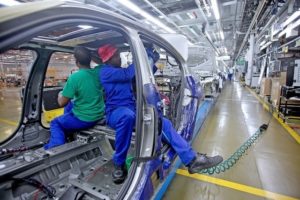
Workers fit electrical cables to the interior of a BMW 3 Series as it passes along the production line in Rosslyn, South Africa. Kevin Sutherland / Bloomberg
International car companies are looking at Africa as the last frontier for automotive growth, beginning a scramble for market share.
South Africa is the only country south of the Sahara with an established motor manufacturing industry and some of the world’s biggest car makers hope to use it as a base from which to expand sales around the continent.
German brands such as BMW and Volkswagen; Ford, Chrysler and General Motors from the US; and Japanese manufacturers Nissan and Toyota already have plants in the country. While most cars are sold locally, many are exported, mostly to Europe and the US. Now Africa is the target.
“Africa is one of the youngest markets in the world and presents huge opportunity in terms of consumption,” said Jeff Nemeth, the president and chief executive of Ford Motor Company of Southern Africa. “The buying power of African consumers is on the rise as the continent’s middle class increases exponentially.”
In April, Ford said it would invest 2.5 billion rand (Dh626.57 million) in its production plant in Pretoria, in the north of the country, to produce one of its latest products, the Everest sport utility vehicle. This follows last year’s commencement of manufacturing the Ranger pickup. Both vehicles were introduced with the African market in mind.
“The recent announcement of our production of the Everest is a natural progression of our long-term strategy in the sub-Saharan region,” Mr Nemeth said. “The Everest shares a platform and some common parts with the hugely successful Ford Ranger and we have a robust plan to increase local suppliers through increased localisation of components.”
Eventually, Ford intends opening plants elsewhere in Africa. It already assembles vehicles in Nigeria using parts shipped in from overseas, as does Nissan. Both plants opened within the past two years. “In future, Ford plans to expand parts accessibility and service support throughout the region,” Mr Nemeth said.
BMW South Africa is also making the pivot northwards. The German maker opened a plant in South Africa in 1973, the first BMW facility outside Germany. For years it has produced the 3-series for the US market – and most of those seen on the streets of Abu Dhabi too.
The local plant built more than 71,000 units last year, according to Lynette Kamineth, BMW South Africa’s spokesman. But last year, the company said it would discontinue producing the 3-series and would begin making the X3 SUV instead.
“With a growing middle class in Africa, the opportunity and potential for an African automotive sector is clear,” Ms Kamineth said. “BMW will take a medium- to long-term approach to its expansion into sub-Sahara Africa and looks forward to the contribution that we can make to unlock this potential in the years to come.”
Other automotive manufacturers are also moving on the African market. In April, the Beijing Automobile International Corporation (BAIC) said it would build a factory at Port Elizabeth on the east coast of South Africa.
Read more here.


